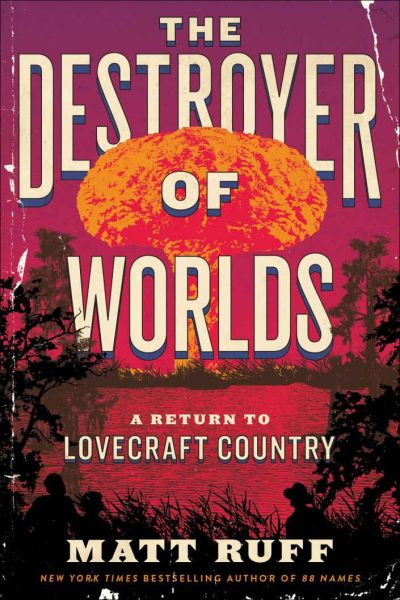Dancing Once Again
The Destroyer of Worlds (Lovecraft Country)
By Matt Ruff

11 Jul, 2024
Matt Ruff’s 2023 The Destroyer of Worlds: A Return to Lovecraft Country is the second in the Lovecraft Country historical cosmic-horror series.
African American Atticus Turner, his family, and his friends, might have hoped that with Caleb Braithwhite’s banishment, their occult adventures had come to an end. To quote Doctor Jon Osterman, “Nothing ever ends.” Their adventures were only beginning!
Adventure is, of course, someone other than the reader having a terrible time.
Magic, even magic that is simply as yet unfamiliar science, is just too convenient to reject, despite the lamentable fates of so many would-be sorcerers. However, not everyone who dabbles in magic does so from hubris or greed. Atticus and his father Montrose’s errand, retrieving the lost bones of a dead witch, is not self-serving. Atticus’s aunt Hippolyta’s desire for a time machine is motivated by past tragedy, but is likewise arguably altruistic.
Hippolyta’s sister Ruby, on the other hand, uses magic potions left by the unfortunate Braithwhite to transform herself into a white woman, thereby gaining access to jobs otherwise barred to her because of her dark skin. Ruby has also commandeered one of Braithwhite’s homes for her own use. Life is good or at least better, for as long as the potion supply holds out.
As for Hippolyta’s husband George? George’s doctor assures him that cancer will kill him in a few months. George very much wants to live. Mundane medicine cannot save him. That leaves only magic, preferably before George’s condition declines to the point he must confess his condition to Hippolyta.
Understandable quests, subject to all too many unforeseen problems. Not being adepts themselves, the crew often has to make bargains with established sorcerers. These sorcerers always have their own agendas. Hiram Winthrop, for example, has been a shade trapped in his own former home ever since Caleb’s father murdered him. Hiram would dearly love to live again and has several irons in the fire in pursuit of that goal.
Adepts also understand the utility of outright theft. Why go to the trouble of creating or recreating some valuable asset if one can simply confiscate it from someone already in possession of that which one covets?
- Braithwhite no doubt schemes even now to recover the magic tome confiscated from him in the first book in this series.
- A thief steals Hippolyta’s a space-time transporter. Too bad for Hippolyta, as the thief leaves his victim adjacent to an impending atom-bomb test. Lest she bear witness against him.
~oOo~
A perhaps mean-spirited note: for reasons that might not stand up to rigorous interrogation, I am profoundly ambivalent at this time about novels concerning the plight of African Americans… that were written by white authors, no matter how sincere. Nevertheless, such works are a huge improvement over SF novels by white novelists who are actively hostile towards African Americans1.
It turns out that supernatural villains are as fond of needlessly convoluted death traps as are regular villains; leaving victims unattended in such a death trap is just as bad an idea as it is when the victim is James Bond. (I note that the thief who left Hippolyta at a bomb site couldn’t stay to watch, for obvious reasons2.)
Word of advice to villains: shooting people is much more immediate and reliable and you can still leave the bodies next to an atomic bomb if you have one handy.
On a related note, it’s always a good idea to compare notes with allies from time to time, even to confide medical conditions the mores of the day treat as unmentionable. To the characters’ credit, once that penny drops, they don’t forget the lesson. Here’s to characters who learn.
Much of the plot in this book involves characters trying to come to terms with death, or to invent comforting lies about it, or to escape it entirely3.
I described this book as cosmic horror. That may give the wrong impression. The great, indifferent forces that shape this universe are only dangerous in the sense that electricity is dangerous. Do the wrong thing and you may die, but there’s no malice, no real horror, involved. All the malice in the novel is purely human malice, as real now as it was decades ago, in the time when the novel is set.
As far as I know, this is the first time Ruff has written a sequel to one of his books. Perhaps on a related note, whereas the end of Lovecraft Country felt like a suitable conclusion, The Destroyer of Worlds leaves a number of plot-hooks dangling. These would justify further installments in the series, should sales warrant4.
Installment hooks aside, Destroyer is a satisfactory adventure. My failure to enjoy it as much as it probably deserves is no doubt due to the cognitive blinder referenced above. Other readers will no doubt enjoy Destroyer more than I did.
The Destroyer of Worlds is available here (Amazon US), here (Amazon Canada), here (Amazon UK), here (Apple Books), here (Barnes & Noble), here (Chapters-Indigo), and here (Words Worth Books).
1: I keep kicking the Farnham’s Freehold can down the road, despite having the perfect review category for it.
2: No fridges appear in this scene.
3:As the characters themselves point out, even the most powerful arcane methods available don’t actually let someone avoid death, only defer it for a while. Will the sorcerers use that extra time productively?
4: Writing further books in the series may be beside the point if some production company picks up where HBO left off. Consider what has happened with Game of Thrones. Also note that current events do not suggest that television shows whose moral is “racism is bad” will be permitted if the 2024 US election goes poorly.
